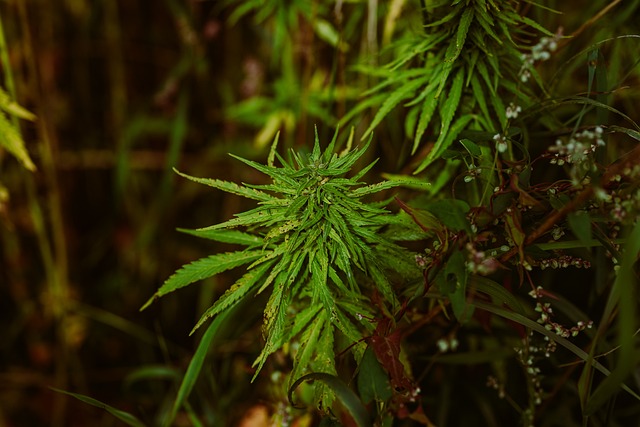THCA flower, a non-psychoactive compound from raw cannabis plants, is gaining attention for its potential to enhance mental clarity and support cognitive function. Unlike its psychoactive counterpart, delta-9 THC, THCA offers these benefits without altering perception. Emerging research and user experiences suggest that consuming THCA-rich cannabis can promote focus and concentration, with the endocannabinoid system's interaction with THCA believed to modulate neurotransmitter activity and provide neuroprotective effects. Additionally, THCA is noted for its anti-inflammatory properties, which may benefit brain health and maintain cognitive function. While generally well-tolerated, users should be aware of potential side effects like dry mouth or low blood pressure, and more severe reactions such as gastrointestinal distress or anxiety with high doses or in sensitive individuals. It's important for new users to start with small amounts and seek medical advice if they have health concerns. For optimal benefits and minimal risks, users should pay attention to their dosage, consumption timing, and overall well-being, ensuring they use high-quality, lab-tested THCA flowers. Regular intake of THCA flower is reported by some to lead to improved focus and better problem-solving abilities, with the best results observed when consumed during less cognitively demanding times and paired with proper hydration and nutrition. Responsible use of THCA flower for mental clarity involves careful consideration of individual tolerance and sourcing to maximize cognitive enhancement while minimizing adverse effects.
Exploring the nuanced effects of THCA flower on cognitive function and mental clarity, this article sheds light on its potential impacts. From the therapeutic properties that may enhance mental acuity to understanding the side effects associated with its consumption, readers will gain a balanced view of the substance. We delve into the science behind THCA flower’s effects, offer strategies for safe usage, and provide insights into how this compound interacts with our mental processes. Join us as we navigate the complex relationship between THCA flower and cognitive health.
- Unveiling the Effects of THCA Flower on Mental Clarity and Cognitive Functioning
- Potential Side Effects of THCA Flower Consumption: A Comprehensive Overview
- Mitigating Risks and Enhancing Benefits: Best Practices for Using THCA Flower for Mental Acuity
Unveiling the Effects of THCA Flower on Mental Clarity and Cognitive Functioning

Delta-9 tetrahydrocannabinol (THC) is well-known for its psychoactive effects, but its precursor, tetrahydrocannabinolic acid (THCA), has garnered attention for its potential impact on mental clarity and cognitive functioning. THCA, found abundantly in raw cannabis plants or the so-called ‘THCA flower,’ is non-psychoactive yet interacts with the body’s endocannabinoid system. Preliminary research suggests that THCA may offer benefits for cognition without the psychoactive ‘high’ associated with its decarboxylated form, THC.
Studies indicate that THCA flower may promote mental clarity by modulating neurotransmitter activity and potentially offering neuroprotective effects. Users report that consuming THCA-rich cannabis in its raw form can help them focus and concentrate better, attributes directly linked to cognitive functioning. This is particularly interesting for those seeking the potential benefits of cannabinoids without impairment. The anti-inflammatory properties of THCA are also believed to be beneficial for brain health, which may contribute positively to maintaining cognitive function over time. As research continues to evolve, the role of THCA flower in enhancing mental clarity and supporting cognitive health remains an exciting area of exploration within the field of cannabinoid science.
Potential Side Effects of THCA Flower Consumption: A Comprehensive Overview

Consumption of THCA flower, which contains the non-psychoactive precursor to THC, has been associated with a range of potential side effects. While it is often cited for its potential benefits in promoting mental clarity and cognitive function, users should be aware of the possible reactions their bodies may have. Some individuals may experience mild side effects such as dry mouth, red eyes, or a temporary decrease in blood pressure upon standing, which typically subside as the body acclimates to the compound. More pronounced adverse effects, though rarer, can include gastrointestinal discomfort, anxiety, or paranoia, particularly at higher doses or for individuals sensitive to cannabinoids. It is important for consumers to start with small amounts to gauge their individual response and to consult with healthcare professionals if they have pre-existing conditions or concerns. Understanding the nuances of THCA flower consumption, including its effects on mental clarity, requires a careful consideration of both the anecdotal user experiences and the scientific research available. As such, users are encouraged to approach its use thoughtfully and responsibly, with attention to dosage and individual sensitivity.
Mitigating Risks and Enhancing Benefits: Best Practices for Using THCA Flower for Mental Acuity

Navigating the potential effects of THCA flower on mental acuity requires a thoughtful approach, balancing the desire for cognitive enhancement with an awareness of possible side effects. To mitigate risks while enhancing benefits, it is crucial to consider dosage and consumption methods carefully. Consuming THCA flower in appropriate amounts can support mental clarity, as preliminary research suggests that THCA may have neuroprotective properties. Users should start with a low dose to gauge individual sensitivity, gradually increasing as needed. It’s also advisable to source high-quality, lab-tested THCA flowers to ensure purity and potency.
Furthermore, timing of consumption can play a significant role in the effects experienced. For optimal mental clarity, it may be beneficial to use THCA flower during times of lower cognitive demand, allowing the body to absorb its effects without overwhelming the mind. Regular users often report increased focus and enhanced problem-solving abilities when using THCA flower responsibly. To maintain these benefits, consistent hydration and a balanced diet are recommended, as they can influence how the body processes the compounds found in the THCA flower. Adhering to best practices for usage, including dosage control and responsible sourcing, can help users enjoy the potential cognitive advantages of THCA flower while minimizing any adverse side effects.
In our exploration, it’s clear that THCA flower holds potential for promoting mental clarity and cognitive functioning. However, consumers must be well-informed of its side effects, which can range from mild to severe and vary by individual. Adhering to best practices, such as dosage control and responsible sourcing, is crucial for mitigating risks and optimizing benefits. For those interested in using THCA flower for its cognitive perks, a balanced approach that prioritizes safety and guidance from healthcare professionals is key. It’s evident that further research will continue to shed light on the nuanced relationship between THCA flower and mental acuity.

